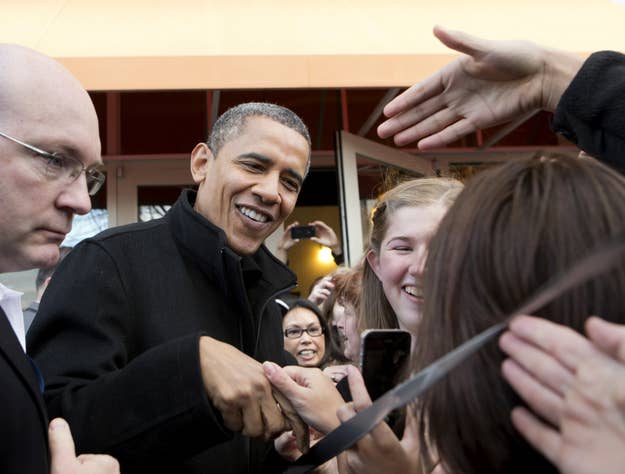
WASHINGTON — The Obama White House is looking to the 2011 battle over the debt ceiling as a cautionary tale for this year's fiscal standoff, crafting a far more aggressive public relations campaign to fend off Republican policy demands.
During the mid-2011 debt ceiling fight, House Republicans credibly threatened to send the economy into a tailspin by refusing to raise the nation's borrowing limit, escalating the conflict and forcing Democrats into a defensive position.
Meanwhile, rather than take his case to the public, Obama wavered between closed-door negotiations with congressional leaders and angry statements to the press. Now the president is making his case directly to the people.
This month, fresh from his reelection victory, Obama plans to keep the fight public, at the cost of any imagined backroom goodwill. The president will hit the road to push his agenda on the fiscal cliff this Friday, traveling to Montgomery County, Pennsylvania.
Obama will "continue making the public case for action by visiting a business that depends on middle-class consumers during the holiday season," a White House official said.
White House aides believe Obama's inside-the-beltway approach to the last crisis contributed to the Republican wins after they took back the House in 2010 on multiple government shutdowns and tax votes.
Now Obama aides believe they have more leverage — with Republicans particularly wary of a tax hike on the top 2% of wage-earners, a tax-increase plan validated, the White House believes, by the presidential election.
Tax rates will go up for everyone at the end of the year, and Obama believes he can win by advocating for the 98%.
The White House's messaging reflects that view. While overtly expressing openness to negotiation, White House Press Secretary Jay Carney also insisted on Monday that there is a narrow set of solutions acceptable to Obama.
"We know what the parameters of a deal look like," Carney said. "We know what the substance beneath the parameters of a deal look like. And we are working, as we speak, with our counterparts on Capitol Hill to try to reach that goal."
And in a move reminiscent of the ill-fated fall 2011 Jobs Bill — a package of tax cuts and stimulus spending that served as the kickoff for the Obama reelection effort — the president started his efforts on the fiscal cliff by negotiating with the public, opening with a call to immediately pass tax cuts for the middle class. Aides admit there is little chance that Congress will act on those tax cuts without some sort of broader deal by the end of the year, but they argue that just by calling for just those cuts, Obama is gaining the upper hand.
And like the Jobs Bill fight — which helped Obama defuse Republican arguments that he was bad for "job creators" — White House aides say that Obama will leverage the bully pulpit to his advantage, with public statements and speeches on top of meetings with lawmakers, business leaders, and other stakeholders. The White House added that Obama — who has struggled through his first term to turn the rhetorical power of the presidency into a meaningful tool on Capitol Hill — will meet with small business executives on Tuesday; on Wednesday he will meet with a group of middle-class voters and another of big business leaders.
Obama met with lawmakers the Friday before the Thanksgiving holiday, but to date, no follow-up meeting has been scheduled.
Obama is also threatening to turn his massive campaign operation on Congress to push his fiscal cliff agenda. Last week the Obama campaign e-mailed supporters a graphic explaining Obama's plan — and top aides have been hinting at a reborn Obama for America intimately engaged in the policy issues of the day. Unburdened by the campaign, the White House itself can be more overtly political, and senior adviser David Plouffe has already e-mailed the entire official e-mail list once. Whitehouse.gov is now dominated by a large image calling for Congress to "Pass the Middle-Class Tax Cuts," including a petition collecting names supporting Obama's agenda.
The very public campaign also may have its political downside. Congressional Republicans argue the move to the campaign trail means Obama may be more interested in posturing than finding a quick resolution.
"Obama would get a lot more done coming to the table — we've already agreed to raise revenue," said one Republican budget staffer.
Congressional Democrats, however, welcome the change in Obama's posture in how he's communicating with them — no longer breaking off in direct talks with Boehner separate from his Democratic colleagues.
"I think a lot has changed since the debt ceiling talks, and our relationship with the White House overall is a lot stronger, but that's been true for the past year and a half," said a Senate Democratic leadership aide. What's happening now is consistent with that better relationship."

